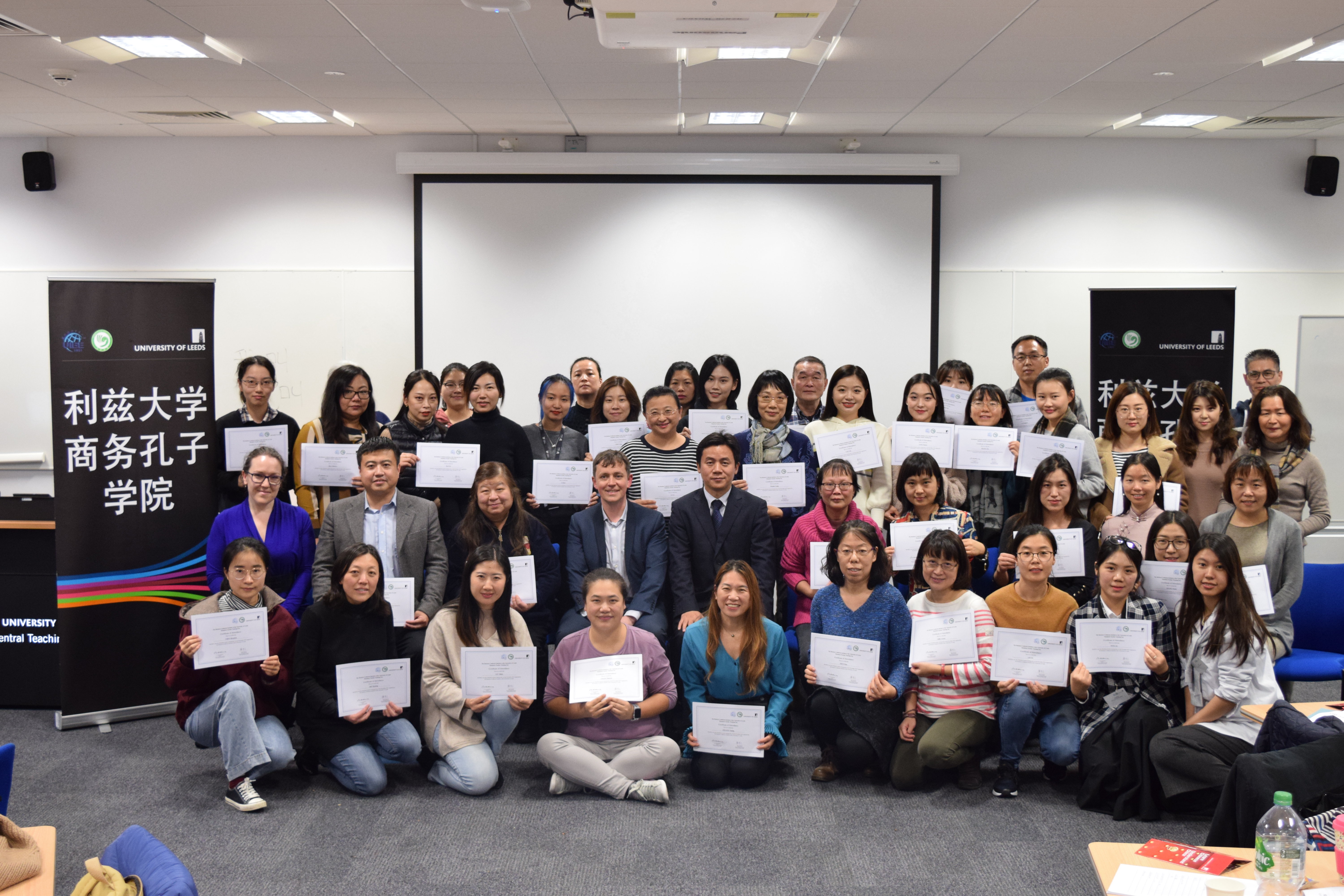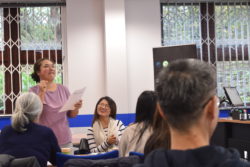Business Confucius Institute runs training event for Mandarin teachers

The excellent attendance and enthusiasm in the room at this Business Confucius Institute teacher training event once again demonstrates local Mandarin teachers’ commitment to their students and professional development.
Over 50 teachers from local schools and other Confucius Institutes gathered at Leeds University Business School on Saturday 2 November for a training day led by Rob Neal.
Rob is the coordinator of the Manchester Swire Language Centre and has been teaching Mandarin for over ten years in secondary schools in Manchester and Sheffield. He is currently doing a part-time PhD with the University of Cambridge, researching the pronunciation of young beginner learners of Chinese.
Joining our Business Confucius Institute staff at the training were teachers from local schools including Leeds Chinese Community School and York Chinese Community School. Pudsey Grange School and Horsforth School, which both joined the Mandarin Excellence Programme this year, sent their Mandarin teaching staff to network and gain inspiration. We were also delighted to welcome teachers from further afield representing Confucius Institutes in Lancashire and Scotland.
Workshop 1: Developing best practice
This opening workshop set the stage for the rest of the day by highlighting the challenges Mandarin teachers face and the existing research knowledge that is available to learn from.
Rob began by drawing from work by his “hero” Rod Ellis, one of the biggest names in second language acquisition and a Leeds alumnus, to cover some key principles of language learning and teaching. He then moved on to discuss the unique characteristics of Chinese that make it difficult for learners and shared these four challenges identified by another leading expert Jane Orton:
- Spoken Chinese is tonal
- The language is written in characters
- The lexicon is composed from a set of only 1200 syllables
- Chinese contains a great many homophones and virtually no English cognates
Participants were encouraged to discuss their own views and experience related to issues such as teaching tones, developing literacy and teaching vocabulary.
As Rob pointed out, “thinking creatively and deeply on days like this helps you to escape the ‘treadmill’ of day to day teaching”. His aim was to inspire attendees to feel excited about their work and maybe even consider adding their own research to the body of knowledge in the field of Teaching Chinese as a Second Language.
You’re developing students as people, as citizens of the world
Workshop 2: Evidence-informed perspectives for teaching pronunciation to beginner learners of Chinese
Rob spoke passionately about the role of teacher research in developing Mandarin Chinese teaching, and shared the story of his own research into “the intelligibility of young anglophone learners of Chinese”.
Although there is currently a lot of interest in Mandarin, Rob pointed out that it is still a minority subject taught predominately in more advantaged schools. Insights from teachers like him who work in inner city schools can develop a more complete picture of the reality of teaching Chinese to all kinds of students, which is needed if the subject is to become truly mainstream.
If Mandarin is to have a future we need to find ways to make it for everyone
This is part of the rationale for his focus on ‘intelligibility’: the extent to which the message is understood by the listener. Acknowledging that this is controversial and believed by some to set the bar too low, Rob argued that it is important for confidence and motivation to set realistic targets. Considering that not even all Chinese people sound ‘perfectly Chinese’ (speaking standard Mandarin, for example), and that many teachers have only one hour per week with their students, being understood is a key goal.
Despite the focus on tones when Mandarin pronunciation is discussed, the examples that Rob shared demonstrated that many students have more serious pronunciation issues than just tones.
Attendees listened to recordings of students to see if they could understand what they were saying. If not, the nature and severity of the errors was discussed. This stimulated valuable debate about which errors lead to serious misunderstandings and which are more similar to having an ‘accent’.
Top tips and practical recommendations included:
- Embrace technology (e.g. voice recognition software on your phone),
- Encourage peer correction in a friendly supportive atmosphere,
- Point out differences between English and Pinyin (e.g. you),
- Try Praat - an acoustic software package that has a pitch tracking device,
- Show students examples of non-Chinese natives speaking Chinese e.g. Mark Zuckerberg,
- Ask students to come up with their own names for each of the tones and don’t be afraid to use lots of gestures.
After hearing a rap that Rob recorded for his own students to learn vocabulary, teachers had a go at putting key words and phrases to a beat and a couple of brave volunteers performed their rap!

Workshop 3: Researching our own classrooms
The final session aimed to get teachers thinking about where they could apply a researcher’s mindset in their own classroom.
Rob recommends action research as a really useful and user-friendly method, and says that you can learn a lot from even small groups of students. This could just be a six-week project into one aspect of your teaching.
When asked to come up with their own ideas for future investigation, teachers had many suggestions including:
- The transition from pinyin to characters
- Pinyin and phonetics
- The role of translation
- Encouraging independence and autonomy so that students study outside the classroom
Although this kind of research isn’t going to 'prove' anything, it can start a conversation and contribute to the development of Mandarin Chinese teaching.
Rob encouraged teachers to gather their findings and submit them to conferences around the world. We hope to see some of our local Mandarin teachers sharing what they learn with other professionals in the future!
View more pictures from the event on our Facebook page.
The BCI holds annual Mandarin teacher training days for local teachers. Sign up to our newsletter to make sure you receive updates about future events.
Related News
Celebrated Chinese author Lu Min begins UK residency in Leeds
Fans of Chinese language, literature and culture gathered at Leeds University Union for a special event hosted by the Business Confucius Institute at the University of Leeds and the Leeds Centre for New Chinese Writing.
Leeds alumna Marie Tulloch shares practical tips and inspiration
The Business Confucius Institute (BCI) welcomed Leeds graduate Marie Tulloch back to campus during Global Careers Week. This was an inspiring talk filled with practical insights about making a career using Chinese language skills.
An intercultural celebration to welcome the Year of the Dragon
On 8 February 2023 almost 100 staff, students and friends braved the snow to join the Business Confucius Institute's Chinese New Year celebrations.
